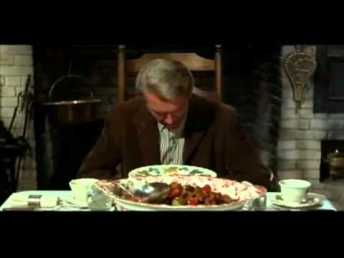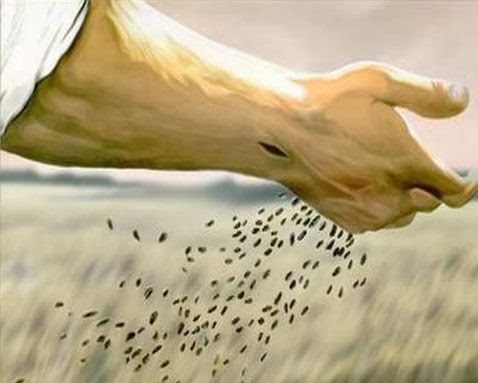 Recently Debbie and I watched a wonderful old Jimmy Stewart movie called “Shenandoah”. The story tells of a prosperous, hardworking Virginia farm family struggling to remain neutral during the Civil War. Stewart was the patriarch of 6 sons, a daughter and one daughter-in-law. They owned no slaves and all they had was the result of their own honest hard work. A fact that Stewart’s character, Charles Anderson, made clear to all people and especially God. In one scene, as the family gathered around for the evening meal, Mr. Anderson offers the following prayer:
Recently Debbie and I watched a wonderful old Jimmy Stewart movie called “Shenandoah”. The story tells of a prosperous, hardworking Virginia farm family struggling to remain neutral during the Civil War. Stewart was the patriarch of 6 sons, a daughter and one daughter-in-law. They owned no slaves and all they had was the result of their own honest hard work. A fact that Stewart’s character, Charles Anderson, made clear to all people and especially God. In one scene, as the family gathered around for the evening meal, Mr. Anderson offers the following prayer:
“Lord, We cleared this land; We plowed it, sowed it, and harvested it. We cooked the harvest. It wouldn’t be here—we wouldn’t be eating it—if we hadn’t done it all ourselves. We worked dog-bone hard for every crumb and morsel But we thank you just the same anyway, Lord, for this food we’re about to eat. Amen.”
This is not exactly the prayer I would offer to the Lord yet there are times in which I feel the same sentiments. And I’m sure many of my hardworking, honest church members would agree with Mr. Anderson’s opinion. It expresses the belief that people should be allowed to stand or fall on their own efforts and not be beholden any earthly entity or even to God.
Hopefully most church-going Christians understand that the blessings they have in their lives come from God and are an expression of God’s love for His children. Still there is a tendency among all people to claim some of the credit for themselves. Having created us, I am sure God recognizes this trait and is tolerant of our self-indulgence. Most likely God uses it to teach us humility and empathy for others.
An attitude of self-sufficiency which promotes bearing fruit for ourselves is an admired trait in American society. Yet it can also lead to isolation from the larger human culture that surrounds us. At the beginning of the film there is a skirmish between confederate and Union soldiers. One of the sons reports it to their father, saying:
“They come closer every day, pa.”
Charlie Anderson asks: “They on our land?
“No, sir.”
“Well, then, it doesn’t concern us.”
You can’t help but like Charlie Anderson. (Who doesn’t like Jimmy Stewart?) And his fiercely independent spirit is a trademark of America’s self-sufficiency and sovereignty. Inevitably the Anderson’s were drawn into the war and would sacrifice members of their family to the conflict. Charlie Anderson would learn that he could not hold the world back beyond the boundaries of his property. The end of the story is bitter-sweet and seems to conclude that no matter how much we attempt to insulate ourselves against the outside world, we are still affected by the events that lie beyond our borders.
God’s church is a missional church. God desires His church to engage in the issues and problems of the world. Some churches choose to be like the Anderson family, stubbornly believing the world will not impose itself upon the community they created. Yet they are inevitably drawn into worldly matters despite their desire for isolation. Others choose to be selective in who they help. Many times I have heard people say, “Why should we help people in some foreign country when we have people in our own community that need help?”
That is a fair question. If it’s not on our land then it doesn’t concern us. So should we be concerned for those who aren’t in our line of sight? The answer for Christians should be an unequivocal “Yes”. In Matthew 25:31-46 Jesus clearly expresses God’s command to “do it to the least of these”. Someone we know or who has common grounds with us is no more or less valuable in God’s eyes than a person of a different culture, religion or nationality.
Ironically, selecting who we will help is as much a form of isolation as not getting involved at all. I often say “I already give to another charity so I cannot give to yours.” I have used that excuse many times in order to fend off solicitations for other charities. The desire to give is genuine, however by helping specific groups I feel an affinity toward, they effectively become my property. In one sense they are boundaries or fences that separate me from the other needs of the world.
Churches do this as well, choosing to help some but not others. When this happens they are considered hypocritical and biased, selecting to help only those who they feel a connection toward. Why do I choose to prevent animals from being used for medical experiments but will not donate for cancer research? Is the life of man’s best friend more valuable than a child dying from cancer? Why does a church raise funds for abused children in their state, but not for children who are war refugees in a foreign and distant land?
There is nothing wrong with gravitating toward a charity that we share empathy for. The culture in which a church exists may value one group or charity while a church in another region will value the needs and work of another aid organization. Much of our giving is based on allocation of resources forcing us to choose some and deny others. Cultural bias does affect who we support, however it is not always hypocritical. It is often times pragmatic.
It is pragmatism which guides my decision to help. Too often I wish I could give more or had greater resources to share the love of God to people in need. Sadly I do not, so I give with the assurance of faith that God will multiply my gift beyond my meager giving. Churches need to cultivate this attitude as well. When Jesus was asked, “And who is my neighbor?” he told the story of the Good Samaritan. The core of this lesson is that our neighbor is whoever we find in need that we can help. It may be the family down the street who can’t pay their heat bill or a hospital in a third world country needing medical supplies. We should cultivate a giving heart which is open to helping in the best way we can when the need is placed before us as was the beaten man before the Samaritan.
Charles Anderson had “500 acres of good soil.” Had the farm been smaller the war may have passed him by. We can shrink our charitable giving and hope the world will also pass us by. If our giving becomes more extensive we will expand the charitable property line we claim as our own. In other words, giving to a broader world spreads our mission field so we claim a larger territory of ministry. As our missional boundaries expand we will encounter other conflicts that threaten to spill into our mission field. Had the Anderson’s farm been larger it may have become a battlefield. By opening our church to greater works we will become involved in the greater worldly conflicts that we strive to avoid. Yet if we shrink our mission field and choose isolation, the world may still impose itself on us.
The Anderson family made hard work and self-sufficiency a core value in their lives. These things were foundational and defined who they were in relationship to the world. Do our churches want to make these same traits integral to the way we interact with the world? Perhaps being a missional church should lie at the heart of our ministry. Reaching beyond our own borders needs to be part of our DNA, an irrefutable part of who we are and how we respond to God’s gift of salvation. We should engage in mission where and when God calls us to do so. We should not decide based on resources or convenience. If we have true faith then we can help others with the assurance that God will provide the means to do so. Missions should not be dictated by geography, resources, affinity or other pragmatic factors. It should be a response to salvation and empowered by faith.
When John the Baptist saw Jesus he declared, “Behold! The Lamb of God who takes away the sin of the world!” The church is the Bride of Christ that calls us to be disciples. Missions lie at the heart of discipleship and while it may impose hardship on the local church it is also what nourishes the Body of Christ, making it stronger and more vital. If we ourselves do not minister to the victims of worldly corruption, either locally or far away, and instead choose isolation, we will become the victims of the “sin of the world” and not an instrument of the Lamb of God.
